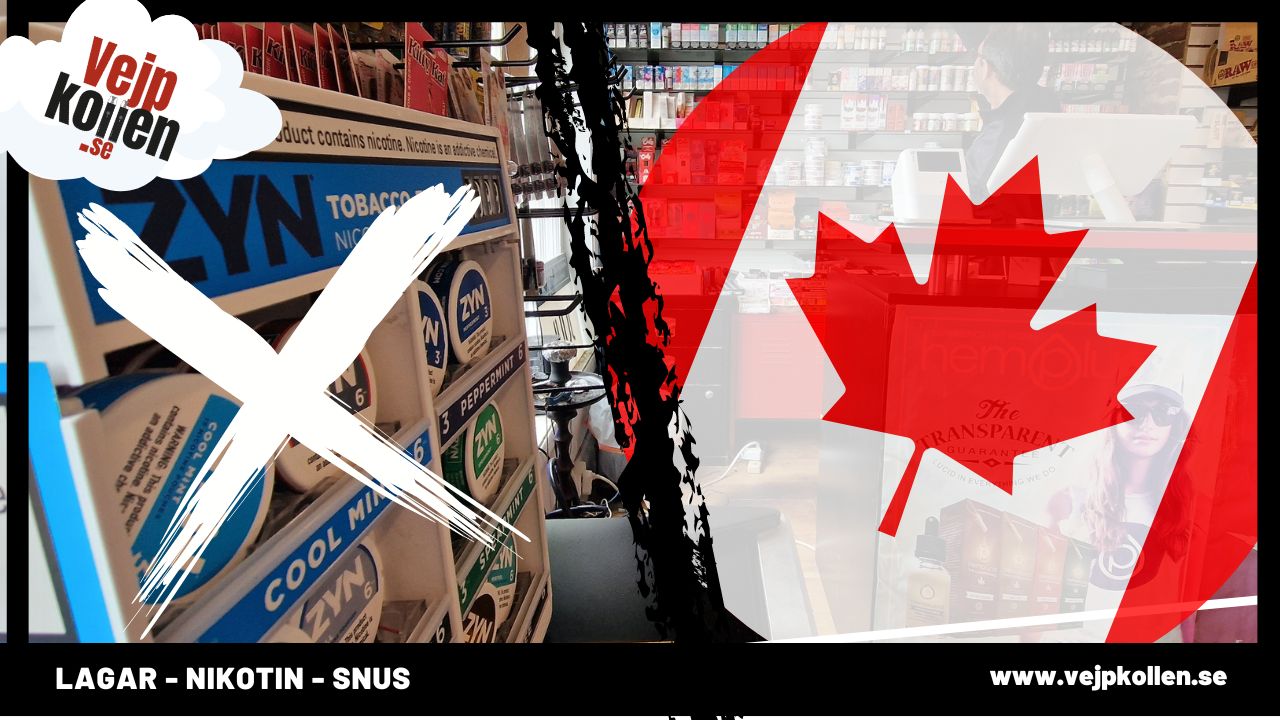Canada's nicotine policy is in a state of flux, with the country's health authority having only recently approved nicotine pouches as a smoking cessation aid - and now the Minister of Health has banned the sale of the products, except in pharmacies. And they can only taste like mint.
Canada's Health Minister Mark Holland (from the Liberal Party of Canada, which governs the country under Prime Minister Justin Trudeau) has been given new powers in late summer, which he has used to ban the sale of flavoured nicotine pouches, according to the website Vaping 360. The crux of the matter is that nicotine pouches were previously approved by Health Canada as a smoking cessation aid.
Reminiscent of the Netherlands
The new rules came into force at the end of August and are aimed at prills as a consumer product, as well as fruity flavours. The approach is similar to the one Australia adopted earlier this summer, but it even requires a printed recipe.
Holland issued a so-called Ministerial order 28 August which, in addition to restricting the sale of nicotine pouches to pharmacies, bans all flavours except mint and menthol.
- Nicotine pouches with flavours like 'icy berries' or tropical fruits will no longer be allowed to be sold anywhere. They will be recalled," Mr Holland said in an interview with Canadian television channel CBC.
With its Ministerial Order, the Government forced Imperial Tobacco Canada to remove non-mint and non-menthol flavours of Zonnic nicotine pouches from Canadian stores.
Contrary to the Agency's recommendations
Health Canada had previously conducted a two-year study in the country on nicotine pouches and only last year approved them as a so-called nicotine replacement product. This means that over the past year they have been regulated in exactly the same way as other replacement products such as gum and patches.
- We want to stop this, before it becomes an epidemic like we had with vejpning, where many people who were not smokers became addicted, and now it has a devastating effect on our health system," trumpeted Mark Holland told CTV News.
He has made similar statements a number of times before, but never directly explained what the devastating effect is.
Chewing gum and lozenges allowed
The ministerial order also imposes restrictions on the labelling and advertising of all nicotine replacement products, including chewing gum and lozenges. After a six-month transition period, manufacturers will then have to update their packaging to include warnings about nicotine addiction and ensure that it is not designed to attract children. Advertising of the products will only be allowed if the purpose is to help smokers quit, and all other marketing will be banned. The difference with nicotine pouches is that gum, lozenges and other existing products will continue to be sold in convenience stores.
- What I hope is that these products are used for their intended purpose - to help people quit smoking - and that we put an end to the explosion of these products among young people," Mr Holland told the CBC.
Accused of abuse of power
He was given the power as recently as June to overturn the regulatory decision made by Health Canada. The new powers, introduced by an amendment in the federal budget bill, give him unprecedented power to restrict the sale, importation and advertising of health products that he considers are being used for other than their intended purpose and could cause harm.
Of course, the move has not gone unnoticed in Canada. Many people have concerns about the substance of the Ministerial Order, and many also believe that giving a minister the power to overrule an agency's decision is way over the line.
- This is an absolute abuse of power. The Health Minister is making it harder for adult smokers who want to quit to access products that actually help them quit. It makes no sense for a country that wants to reduce smoking to target products that help people quit. This unprecedented power grab distorts a scientific and evidence-based approval process for therapeutic products and taints it with ideological considerations," writes Imperial Tobacco Canada in a press release obtained by Vaping 360.
The deadly use of nicotine
Mark Holland used to work at Heart & Stroke (formerly known as the Heart and Stroke Foundation of Canada) and has also previously used strong rhetoric around nicotine pouches and vejping. He has suggested that they are designed by "evil" tobacco companies to lure children into lifelong nicotine addiction. He has also claimed that nicotine use is "deadly."
Earlier this year, the Netherlands also started the process of banning most vejp flavours, an initiative already looked at by Health Canada but currently on hold.
12 per cent smoke
At the moment we use 12 per cent of the Canadian population cigarettes daily. This compares to Sweden where only half as many people smoke, while 15 and 20 per cent sniffing white or brown snuff. Smoking is the most harmful form of nicotine use, while snus and vejpning generally considered much less dangerous.




